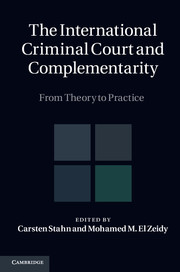Book contents
- Frontmatter
- Contents
- Acknowledgments
- Foreword by HE Judge Sang-Hyun Song
- Foreword by Patricia O’Brien
- Foreword by Silvia A. Fernandez de Gurmendi
- List of abbreviations
- Introduction: bridge over troubled waters?
- PART I General reflections
- PART II Origin and genesis of complementarity
- PART III Analytical dimensions of complementarity
- PART IV Interpretation and application
- 14 The application of the principle of complementarity to the decision of where to open an investigation
- 15 Situation and case: defining the parameters
- 16 The inaction controversy
- 17 The admissibility procedures
- 18 The evolution of the ICC jurisprudence on admissibility
- 19 Interpretative gravity under the Rome Statute
- 20 Complementarity and burden allocation
- PART IV (Continued) Interpretation and application
- PART V Complementarity in perspective
- PART VI Complementarity in practice
- Index
- References
20 - Complementarity and burden allocation
from PART IV - Interpretation and application
Published online by Cambridge University Press: 05 November 2014
- Frontmatter
- Contents
- Acknowledgments
- Foreword by HE Judge Sang-Hyun Song
- Foreword by Patricia O’Brien
- Foreword by Silvia A. Fernandez de Gurmendi
- List of abbreviations
- Introduction: bridge over troubled waters?
- PART I General reflections
- PART II Origin and genesis of complementarity
- PART III Analytical dimensions of complementarity
- PART IV Interpretation and application
- 14 The application of the principle of complementarity to the decision of where to open an investigation
- 15 Situation and case: defining the parameters
- 16 The inaction controversy
- 17 The admissibility procedures
- 18 The evolution of the ICC jurisprudence on admissibility
- 19 Interpretative gravity under the Rome Statute
- 20 Complementarity and burden allocation
- PART IV (Continued) Interpretation and application
- PART V Complementarity in perspective
- PART VI Complementarity in practice
- Index
- References
Summary
There are no hard-and-fast standards governing the allocation of the burden of proof in every situation. The issue, rather, ‘is merely a question of policy and fairness based on experience in the different situations’.
Despite lying at the heart of the functionality of the International Criminal Court (ICC), Article 17 of the Rome Statute, which embodies the complementarity principle, fails to address a number of key issues surrounding the operation and interpretation of this pivotal regime. Specifically, the Statute neglects to delineate the standard of proof that must be met in order for the Court to find that a state is unwilling or unable to carry out an investigation or prosecution. What is more, there is scant guidance as to which party should bear the burden of proof in this regard. Further enlightenment on these issues is unlikely to be distilled from the Rules of Procedure and Evidence. These statutory gaps required Trial Chamber III to recently determine the issues of burden allocation and the requisite standard of proof in the Bemba case. However, it remains to be seen whether the Chamber's position ought to extend to the multitude of scenarios in which the Court may be called upon to rule on admissibility. Likewise, whether the Chamber's approach will be – or should be – endorsed by the ICC Appeals Chamber remains an open question. In considering these crucial operational elements of the regime, this chapter will look at burdens and standards of proof both generally and in specific relation to complementarity, considering the potential scenarios that may arise in relation to state referrals, proprio motu investigations and, in particular, Security Council referrals. Rather than provide definitive answers regarding the questions of applicable burdens and standards of proof, this chapter aims to contribute to the dialogue on these issues, first and foremost by examining the emerging ICC jurisprudence, while also drawing upon the experience of other courts operating in the international and municipal realms, including the practice of the UN ad hoc tribunals.
- Type
- Chapter
- Information
- The International Criminal Court and ComplementarityFrom Theory to Practice, pp. 642 - 682Publisher: Cambridge University PressPrint publication year: 2011
References
- 1
- Cited by



